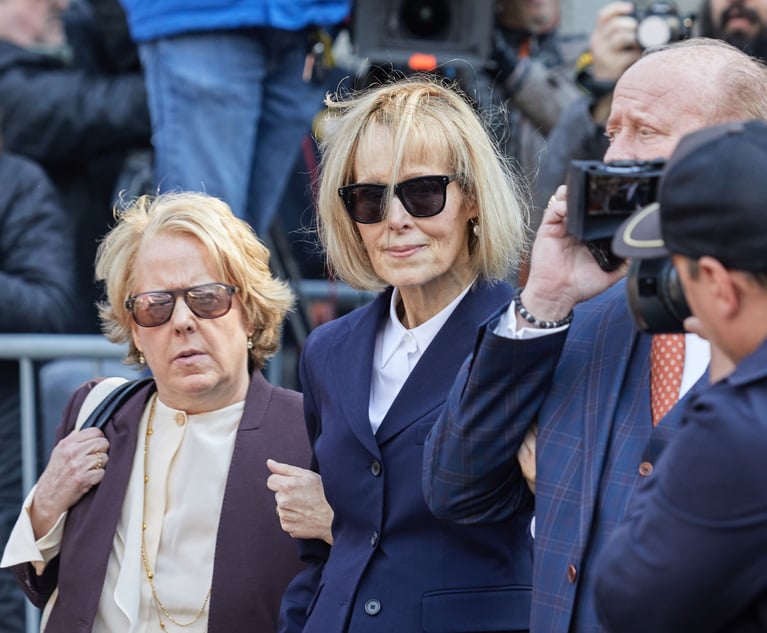Acquittals in Sex Tape Trial Shift Focus to Related Civil Suits
Civil litigation between former Waffle House CEO Joe Rogers Jr. and the woman and lawyers who arranged to video record him in a sexual encounter has been grinding along in Cobb County for nearly six years. Lawyers on both sides say the battle will continue despite the trio's acquittal on criminal charges.
April 13, 2018 at 06:35 PM
5 minute read

A lawyer for former Waffle House CEO Joe Rogers Jr. made clear Friday that the acquittal of three defendants, charged in Fulton County with illegally video recording Rogers during a sexual encounter, wouldn't impede his civil litigation against the trio in Cobb County.
“The 'not guilty' verdict does nothing to diminish Joe Rogers' claims in the Cobb litigation,” wrote Moore Ingram Johnson & Steele partner Robert Ingram in an email. “As you may recall, OJ [Simpson]'s 'acquittal' did not shield him from later civil judgments.”
Ingram also said the ruling will not dislodge a ruling by Cobb County Superior Court Judge Robert Leonard II disqualifying lawyers John Butters and David Cohen from representing Rogers' ex-housekeeper Mye Brindle after determining that they had assisted her in unlawful conduct.
The verdict “does nothing to impact” Leonard's orders, said Ingram, which “were all affirmed on appeal and are 'law of the case' that cannot be undone by a ruling in another case.”
Brindle's lawyer, Darren Summerville, said the Fulton jury “rightfully concluded that there was no crime committed or criminal wrongdoing on behalf of Ms. Brindle or her counsel.”
“The acquittals end the efforts by Mr. Rogers and his counsel to silence Ms. Brindle and derail her civil case. The jury's vindication will now pave the way for trial later this year in Cobb County,” said Summerville, also in an email.
There was no reply to queries from Butters, Cohen or their attorneys,
The Fulton criminal trial stemmed from a flurry of civil litigation that dates to 2012, when Brindle enlisted the aid of Cohen and Butters to commence legal action against Rogers. She claimed he had been coercing her to masturbate him as part of her duties since 2003.
The lawyers helped Brindle acquire a small surveillance camera and assistance in its use, and she recorded an encounter in Rogers' bedroom. Shortly thereafter, the lawyers sent Rogers a demand letter saying they were preparing to file a sexual harassment suit. During a mediation, Brindle and her lawyers reportedly asked for $12 million to drop the matter.
Instead, Rogers sued Brindle in Cobb County Superior Court for invasion of privacy and intentional infliction of emotional distress.
A few days later, Brindle sued Rogers in Fulton County State Court asserting claims for racketeering, battery and intentional infliction of emotional distress. That suit was dismissed 21 days later, and Brindle agreed to file counterclaims in the Cobb litigation. (It took years of more litigation before a Fulton judge found held that Cohen owed Rogers nearly $199,000 in attorney fees because Cohen “unnecessarily expanded the proceedings … for the purposes of delay and harassment.”)
In the Cobb litigation, Leonard in 2015 disqualified Butters and Cohen from representing Brindle. The judge ruled that the lawyers had advised Brindle in the commission of a crime—the same one for which the Fulton jury acquitted them—and that they might be called as witnesses against her.
Leonard and the Cobb bench subsequently recused; The litigation is now before Mountain Circuit Senior Superior Court Judge Martha Christian.
While the Cobb litigation ground on, Fulton County District Attorney Paul Howard Jr. indicted Brindle, Butters and Cohen in 2016 on four felony charges including violations of Georgia's illegal surveillance law.
Judge Henry Newkirk threw out the charges, but the Georgia Supreme Court reinstated them in November. After a seven-day trial, a jury acquitted the trio Wednesday.
While Ingram, Rogers' lawyer, decried the verdict and some of Newkirk's rulings, he said Rogers' position in the Cobb litigation is sound.
In Rogers' suit against Butters and Cohen, “the video was found to be unlawful, the attorney client privilege pierced, Butters and Cohen disqualified due to their involvement in Brindle's illegal activity, and the video ruled inadmissible as evidence,” Ingram wrote.
Ingram wrote that, in that suit, “the trial court permitted Rogers to sue Butters and Cohen for their tortious activity. They appealed by asserting, in part, that their actions as 'lawyers being lawyers' shielded them from civil liability.”
The Court of Appeals, he said, “ruled that it did not—that they could be held civilly accountable because their alleged conduct was 'tortious and criminal.'”
“It is clear to me that nothing could be worse for the reputation of lawyers in this state than if a public perception were allowed to take hold that breaking the law is permissible so long as someone carrying a Bar card can claim they were acting 'as a lawyer,'” Ingram said.
Regardless of the criminal verdict, Ingram said, “the alleged conspiracy to extort money from Rogers remains at issue in the Cobb civil proceedings,” he said.
This content has been archived. It is available through our partners, LexisNexis® and Bloomberg Law.
To view this content, please continue to their sites.
Not a Lexis Subscriber?
Subscribe Now
Not a Bloomberg Law Subscriber?
Subscribe Now
NOT FOR REPRINT
© 2025 ALM Global, LLC, All Rights Reserved. Request academic re-use from www.copyright.com. All other uses, submit a request to [email protected]. For more information visit Asset & Logo Licensing.
You Might Like
View All
Sanctions Order Over Toyota's Failure to Provide English Translations of Documents Vacated by Appeals Court
4 minute read
Second Circuit Upholds $5M Judgment Against Trump in E. Jean Carroll Case
4 minute read
'Paragraph V Displaced Lathrop': High Court Mulls Sovereign Immunity Waiver Disputes
7 minute read
11th Circuit Revives Project Veritas' Defamation Lawsuit Against CNN
Trending Stories
- 1On The Move: Energy Infrastructure Pro Joins Moore & Van Allen, Adams & Reese Changes Atlanta Leadership
- 2Miami Attorneys Secure $4M Settlement Despite Insurance Limits
- 3NY Judge Admonished Over Contributions to Progressive Political Causes
- 4Legaltech Rundown: Alexi Launches an AI Litigation Tool, Hotshot Announces Private Equity Practice Courses, and More
- 56-48. It’s Comp Time Again: How To Crush Your Comp Memo
Who Got The Work
Michael G. Bongiorno, Andrew Scott Dulberg and Elizabeth E. Driscoll from Wilmer Cutler Pickering Hale and Dorr have stepped in to represent Symbotic Inc., an A.I.-enabled technology platform that focuses on increasing supply chain efficiency, and other defendants in a pending shareholder derivative lawsuit. The case, filed Oct. 2 in Massachusetts District Court by the Brown Law Firm on behalf of Stephen Austen, accuses certain officers and directors of misleading investors in regard to Symbotic's potential for margin growth by failing to disclose that the company was not equipped to timely deploy its systems or manage expenses through project delays. The case, assigned to U.S. District Judge Nathaniel M. Gorton, is 1:24-cv-12522, Austen v. Cohen et al.
Who Got The Work
Edmund Polubinski and Marie Killmond of Davis Polk & Wardwell have entered appearances for data platform software development company MongoDB and other defendants in a pending shareholder derivative lawsuit. The action, filed Oct. 7 in New York Southern District Court by the Brown Law Firm, accuses the company's directors and/or officers of falsely expressing confidence in the company’s restructuring of its sales incentive plan and downplaying the severity of decreases in its upfront commitments. The case is 1:24-cv-07594, Roy v. Ittycheria et al.
Who Got The Work
Amy O. Bruchs and Kurt F. Ellison of Michael Best & Friedrich have entered appearances for Epic Systems Corp. in a pending employment discrimination lawsuit. The suit was filed Sept. 7 in Wisconsin Western District Court by Levine Eisberner LLC and Siri & Glimstad on behalf of a project manager who claims that he was wrongfully terminated after applying for a religious exemption to the defendant's COVID-19 vaccine mandate. The case, assigned to U.S. Magistrate Judge Anita Marie Boor, is 3:24-cv-00630, Secker, Nathan v. Epic Systems Corporation.
Who Got The Work
David X. Sullivan, Thomas J. Finn and Gregory A. Hall from McCarter & English have entered appearances for Sunrun Installation Services in a pending civil rights lawsuit. The complaint was filed Sept. 4 in Connecticut District Court by attorney Robert M. Berke on behalf of former employee George Edward Steins, who was arrested and charged with employing an unregistered home improvement salesperson. The complaint alleges that had Sunrun informed the Connecticut Department of Consumer Protection that the plaintiff's employment had ended in 2017 and that he no longer held Sunrun's home improvement contractor license, he would not have been hit with charges, which were dismissed in May 2024. The case, assigned to U.S. District Judge Jeffrey A. Meyer, is 3:24-cv-01423, Steins v. Sunrun, Inc. et al.
Who Got The Work
Greenberg Traurig shareholder Joshua L. Raskin has entered an appearance for boohoo.com UK Ltd. in a pending patent infringement lawsuit. The suit, filed Sept. 3 in Texas Eastern District Court by Rozier Hardt McDonough on behalf of Alto Dynamics, asserts five patents related to an online shopping platform. The case, assigned to U.S. District Judge Rodney Gilstrap, is 2:24-cv-00719, Alto Dynamics, LLC v. boohoo.com UK Limited.
Featured Firms
Law Offices of Gary Martin Hays & Associates, P.C.
(470) 294-1674
Law Offices of Mark E. Salomone
(857) 444-6468
Smith & Hassler
(713) 739-1250






